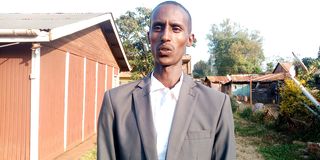The road not taken: Graduate carves out first job out of community’s pain

Emmanuel Hirkena during an interview at his Marsabit home on August 11, 2020. He urged other graduates to be innovative in finding sources of income.
What you need to know:
- He has been a source of inspiration in this part of Kenya that is classified under the arid and semi-arid lands.
- Besides the taxi business, he practices kitchen gardening. He grows kales, onions and tomatoes within their homestead for subsistence and sells the surplus.
When Emmanuel Hirkena, 26, graduated from the Jomo Kenyatta University of Science and Technology (JKUAT) with a Bachelor of Actuarial Science in 2015, he knew pretty well that he was joining the ranks of millions of other jobless youths.
It was not easy, recalls Mr Hirkena of the time when, armed with his second class honours (upper division) papers and bubbling optimism, he ventured out to look for a job.
“It’s only after graduating from college that you realise there is some unique point of confluence for both the learned and unlearned out here. How you take the challenge is what makes or breaks you,” Mr Hirkena told the Nation in an interview in Marsabit town.
Not one to hold out for the elusive white-collar jobs, Mr Hirkena reckoned that he could earn a living by solving some of the problems faced by his community. That meant plunging headlong into the informal sector.
He had noticed the agony of his community with regard to transport and felt he could help “commercialise pastoralism” by helping his people take their animals to the market.
“Our people have to travel eight kilometres from Hula Hula to Marsabit town to sell their animals, for their shopping and other business activities," Mr Hirkena said.
A temporary job he secured with the National Drought Management Authority (NDMA) came as a godsend. From his little savings, he was able to buy a Toyota Probox, which he uses as a taxi.
Buy a truck
His initial dream was to buy a truck, which would help his people take livestock to the market in Marsabit, Merille and Nairobi.
He, however, could not raise the money to purchase a truck. Besides, Covid-19 ruined everything, what with the restriction of movement to curb the spread of the viral disease.
Hirkena’s passion for learning and outstanding academic excellence became manifest right from primary and high school back in Marsabit County.
When he sat his Kenya Certificate of Secondary Education exams at St Joseph’s Secondary School, he managed to score a strong scored B+ grade in a historically marginalised county that is synonymous with poor performance.

Emmanuel Hirkena talks to a client beside his Toyota Probox taxi at Laisamis Trading Centre on August 24, 2020. He turned to taxi business as he continues with job-hunting.
A firm believer in continuous learning, Mr Hirkena is currently a student member of the Institute and Faculty of Actuaries (IFOA), where has obtained three professional papers and still counting.
While he has not given up on his search for formal employment, he advises fellow graduates against staying idle waiting for white-collar jobs.
“The taxi business may not be as lucrative as people may think but, I assure you at the end of each day I pocket at least Sh1,000,” Mr Hirkena revealed.
His long-term goal is to serve and empower his community in any leadership position.
Besides the taxi business, he practises kitchen gardening. He grows kales, onions and tomatoes within their homestead for subsistence and sells the surplus.
Right attitude
He calls for optimism among the youth, many of who have been rendered jobless by poor governance and education-related factors.
“It is not a walk in the park out here, but if you maintain the right attitude, optimism and work smart, I assure you, all is not lost,” Hirkena challenged his peers.
He has been a source of inspiration in this part of Kenya that is classified under the arid and semi-arid lands.
Samuel Orkhobeste, who holds a Bachelor of Science (Biochemistry) and Dolly Lepati, who has a Bachelor of Nutrition and Dietetics, concurred that optimism, trust and self-confidence are the key components of holistic well-being amid the joblessness storm.




